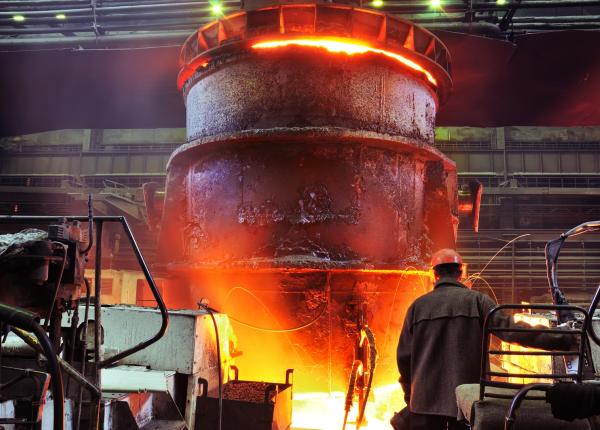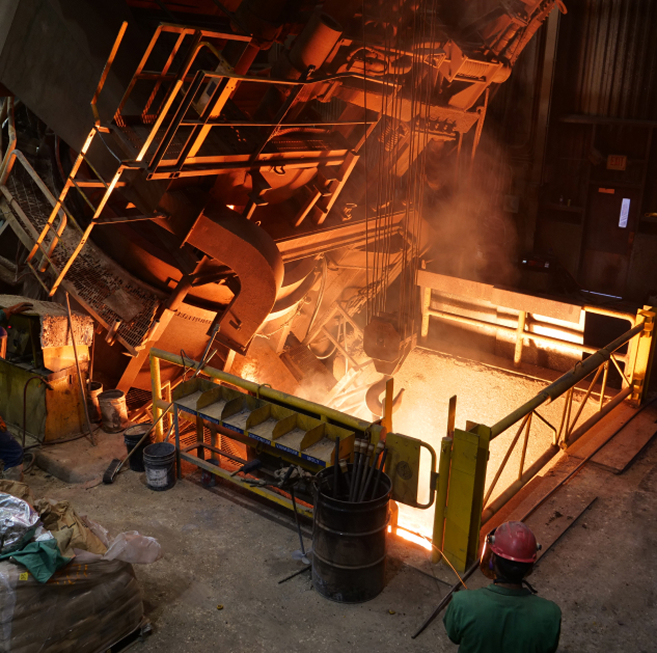Comprehensive Look into How a Metal Foundry Functions
Wiki Article
A Comprehensive Overview to Metal Casting: Benefits and Providers Used by Foundries
Metal casting is an essential process in numerous industries, supplying countless benefits via the solutions of factories. These centers transform liquified metal into precise and durable parts, satisfying details customer requirements. By using innovative technologies, foundries assure quality and efficiency in production. The complexities of metal casting and the varied techniques included increase essential questions regarding its role in modern manufacturing. What innovations lie ahead in this vital area?Comprehending the Metal Casting Process
The metal casting procedure is an essential strategy used in producing to create intricate forms and parts. This method entails pouring molten metal right into a mold and mildew made to form the wanted things. The process begins with pattern development, which functions as a layout for the mold. Aluminum Foundry. Different products, such as sand, metal, or ceramic, are utilized for mold-making, depending on the details demands of the casting
When the mold and mildew is prepared, molten metal is poured into it and permitted to cool and solidify. After solidification, the mold and mildew is removed, revealing the cast part. Numerous strategies, consisting of sand casting, investment casting, and die casting, are employed, each fit to various applications and materials. Quality assurance procedures, such as examinations and testing, are necessary to guarantee the final item meets requirements. In general, the metal casting procedure plays a vital duty in creating parts for markets ranging from automobile to aerospace.
Secret Benefits of Metal Casting
Metal casting supplies considerable benefits that make it a favored production technique in different markets. Its layout flexibility and accuracy enable for intricate forms, while economical mass production improves efficiency. Furthermore, the adaptability and strength of materials utilized in casting add to the resilience of the end products.Style Versatility and Accuracy
Launching exceptional style adaptability and accuracy, metal casting enables designers and designers to create detailed shapes and functions that would be difficult or impossible to accomplish with other producing methods. This ability enables the manufacturing of complex geometries, interior structures, and great details that enhance item capability and looks. Additionally, different casting methods, such as sand casting, financial investment casting, and die casting, give additional alternatives for modification, accommodating diverse product buildings and job demands. The versatility of mold and mildews permits alterations throughout the style stage, enhancing the shift from principle to last product. Eventually, metal casting attracts attention for its capability to provide high-precision elements, making it an indispensable procedure in markets ranging from auto to aerospace and past.Affordable Mass Manufacturing
Cost-efficient automation stands as one of the key advantages of metal casting, enabling makers to create large quantities of elements at a lower cost each. This efficiency emerges from the capability to create detailed molds that can be recycled numerous times, substantially reducing arrangement and operational costs. In addition, metal casting procedures, such as sand casting and pass away casting, permit high throughput, making it viable to satisfy the needs of large-scale manufacturing runs. The minimized product waste and power intake even more improve price financial savings, making metal casting an eye-catching choice for markets requiring mass components. In general, the affordable nature of metal casting positions it as a preferred method for makers aiming for financial performance in their production procedures.Material Flexibility and Toughness
Among the standout attributes of metal casting is its exceptional product convenience, which permits making use of a wide variety of alloys and steels. This versatility allows producers to pick materials that best suit their specific applications, from aluminum and bronze to iron and steel. Each metal supplies one-of-a-kind buildings, including differing levels of toughness, corrosion resistance, and thermal conductivity. Consequently, metal casting can create elements that fulfill rigid performance requirements throughout varied markets, such as automotive, aerospace, and building and construction. Additionally, the stamina of actors steels can be improved with different treatment processes, guaranteeing toughness and durability. Aluminum Casting. Generally, the mix of material versatility and intrinsic strength makes metal casting a favored selection for generating top quality componentsKinds of Metal Casting Strategies
Metal casting includes a range of methods that deal with different manufacturing needs and material homes. Usual methods consist of sand casting, which makes use of a sand mold and mildew for complicated shapes, and financial investment casting, recognized for its accuracy and surface area finish. Die casting is another technique that employs high-pressure shot of liquified metal right into mold and mildews, suitable for mass manufacturing of little components.Shell molding provides a quicker alternate, making use of a resin-coated sand to create thin-walled molds, while lost foam casting enables detailed styles without the requirement for a core.
In addition, continuous casting is made use of for creating lengthy areas of metal, such as sheets or bars, by strengthening molten metal in a continual process. Each technique is and presents unique benefits picked based on factors like the called for detail, production volume, and material type, ensuring superior end results in metal manufacture throughout various industries.
The Function of Foundries in Metal Casting
Shops play a critical role in the metal casting procedure, acting as the facilities where molten metal is changed into finished products. These specialized facilities are equipped with the needed devices and innovations to manage different metals, making certain premium end results. Factories are responsible for numerous vital features, consisting of melting the metal, putting it right into mold and mildews, and enabling it to solidify.In addition, they keep rigorous safety and ecological criteria to secure employees and decrease ecological influence. Proficient specialists and designers collaborate to enhance casting processes, improving effectiveness and decreasing waste. Shops also participate in quality assurance procedures, ensuring that the end products fulfill specific tolerances and specifications. This quality guarantee is essential for sectors that count on accurate components, such as vehicle and aerospace. Therefore, foundries contribute significantly to the total manufacturing landscape, making it possible for advancement and growth across different markets.
Custom-made Metal Casting Solutions
Custom-made metal casting services provide customized layout options that meet specific client needs. These solutions likewise offer material choice knowledge, ensuring the best metal is picked for the desired application. Such flexibility and expertise improve the general high quality and performance of the final item.
Customized Design Solutions
Tailored design solutions in metal casting provide manufacturers with the versatility to produce parts that meet particular efficiency and visual requirements. Shops provide tailored services that allow clients to define dimensions, forms, and surface area finishes to accomplish desired results. This modification process usually consists of partnership between designers and developers, making sure that the end products align with functional requirements and market criteria. Advanced technologies, such as computer-aided style (CAD) and simulation software program, allow precise modeling and testing of elements before production, improving and lessening errors efficiency. By leveraging tailored style remedies, businesses can optimize capability while lowering waste and expenses, ultimately resulting in a more affordable edge on the market. This adaptability is necessary for sectors requiring one-of-a-kind applications and requirements.Material Option Proficiency
When picking materials for Aluminum Foundry metal casting, experience plays a crucial role in making sure that the right option lines up with both performance needs and cost-effectiveness. Foundries utilize experienced specialists who comprehend the homes of numerous steels and alloys, allowing them to advise suitable products for certain applications. Factors such as stamina, corrosion resistance, and thermal conductivity are meticulously considered to meet the client's needs. Furthermore, sector fads and advancements in material scientific research educate these decisions, making it possible for shops to remain affordable. By leveraging their know-how, shops can assist customers in steering with complicated product options, eventually causing boosted product top quality and decreased manufacturing costs. This customized knowledge is essential for accomplishing successful end results in custom metal casting solutions.Top Quality Control in Metal Casting
Quality control in metal casting is critical to guarantee that the last products satisfy the called for specifications and efficiency standards. Shops employ a selection of approaches and strategies to ensure the finest of actors parts. This procedure begins with strict material inspections, validating that raw materials follow market criteria. Throughout the casting process, real-time surveillance and screening are carried out to assess parameters such as temperature, mold and mildew stability, and dimensional accuracy.
Applications of Metal Castings Across Industries
Metal spreadings play a vital role in various sectors, acting as the foundation for plenty of applications. In the auto field, cast parts such as engine blocks and transmission real estates are essential for automobile performance and dependability. The aerospace industry relies on accuracy castings for critical elements that guarantee safety and efficiency in flight. In addition, the building sector utilizes metal castings for components, installations, and architectural elements, improving the longevity of buildings and framework.Moreover, the energy industry benefits from castings used in generator blades and other devices essential for power generation - Aluminum Foundry. The medical field also utilizes metal castings in gadgets and instruments, demonstrating the convenience of this production procedure. On the whole, metal spreadings are indispensable to the performance and development of diverse fields, showcasing their value in modern technology and framework growth
Frequently Asked Inquiries
What Products Are Generally Utilized in Metal Casting?
Common materials used in metal casting include aluminum, iron, brass, steel, and bronze. Each product supplies one-of-a-kind residential or commercial properties suitable for various applications, allowing makers to select the ideal option based upon toughness, weight, and rust resistance.The length of time Does the Metal Casting Refine Usually Take?
The metal casting process commonly takes several hours to a few days, depending upon elements such as the complexity of the design, type of metal made use of, and the certain casting approach employed by the foundry.
What Is the Ecological Influence of Metal Casting?
The ecological influence of metal casting consists of power intake, exhausts, and waste generation. Factories frequently apply measures to minimize these effects, such as recycling materials and making use of cleaner innovations to reduce their eco-friendly impact.Can Metal Casting Be Provided For Small-Scale Projects?
Metal casting can indeed be carried out for small-scale tasks. Different foundries accommodate such needs, using customized options that fit minimal manufacturing runs while maintaining quality and precision in the end products.What Are the Precaution in Metal Casting Foundries?
In metal casting shops, precaution consist of individual protective tools, appropriate air flow, training on equipment usage, emergency situation procedures, routine maintenance checks, and adherence to market security criteria to reduce risks related to liquified metal and hazardous materials.Additionally, metal casting processes, such as sand casting and pass away casting, allow for high throughput, making it possible to meet the needs of massive production runs. One of the standout qualities of metal casting is its impressive material adaptability, which permits for the use of a large array of alloys and steels. Furthermore, continuous casting is made use of for producing long sections of metal, such as bars or sheets, by strengthening liquified metal in a continuous procedure. Factories play a crucial function in the metal casting process, offering as the centers where molten metal is transformed right into ended up products. Usual materials made use of in metal casting include aluminum, iron, bronze, steel, and brass.
Report this wiki page